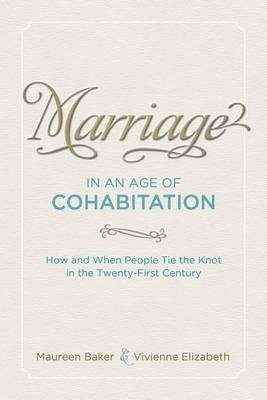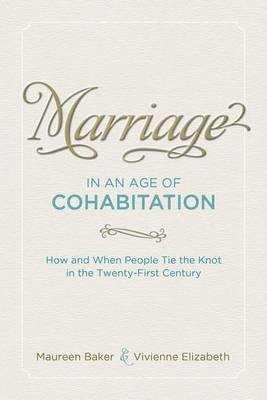
- Retrait gratuit dans votre magasin Club
- 7.000.000 titres dans notre catalogue
- Payer en toute sécurité
- Toujours un magasin près de chez vous
- Retrait gratuit dans votre magasin Club
- 7.000.0000 titres dans notre catalogue
- Payer en toute sécurité
- Toujours un magasin près de chez vous
Marriage in an Age of Cohabitation
How and When People Tie the Knot in the Twenty-First Century
Maureen Baker, Vivienne Elizabeth
Livre broché | Anglais
18,45 €
+ 36 points
Description
In the past few decades, legal marriage rates have declined in the Western world. Many heterosexual and same-sex couples today are living together or cohabitating for several years before tying the knot. The changing nature of intimate relationships and the very meaning of marriage have resulted in a period of extended intimate partnership that may - or may not - result in marriage. Sociologists Maureen Baker and Vivienne Elizabeth present a cutting-edge discussion of contemporary ideas about marriage and living together. They explore the reasons why certain couples who cohabitate eventually decide to formalize their long-term relationship, and whether formalization actually makes a difference for the couple and those around them. While the decision to marry has evolved from previous generations, so have the practices surrounding wedding rituals. The authors discuss aspects of the wedding industry, examining which traditions couples are retaining and which they are personalizing, such as writing non-patriarchal vows and sharing personal stories about their relationship. The authors also compare the cohabitation and wedding rituals practiced by same-sex and different-sex couples. Baker and Elizabeth draw on a wide range of international studies - from Canada, Australia, New Zealand, the United Kingdom, and the United States - as well as their own research, in which they interviewed marriage celebrants and long-term cohabitants who are heterosexual and gay/lesbian, aged from 28 to 63, and from a variety of social backgrounds. The result is a fascinating, multi-generational study of the lives of couples around the world as they negotiate their relationships in the twenty-first century.
Spécifications
Parties prenantes
- Auteur(s) :
- Editeur:
Contenu
- Nombre de pages :
- 224
- Langue:
- Anglais
Caractéristiques
- EAN:
- 9780199002634
- Date de parution :
- 01-04-14
- Format:
- Livre broché
- Format numérique:
- Trade paperback (VS)
- Dimensions :
- 152 mm x 226 mm
- Poids :
- 249 g

Les avis
Nous publions uniquement les avis qui respectent les conditions requises. Consultez nos conditions pour les avis.






